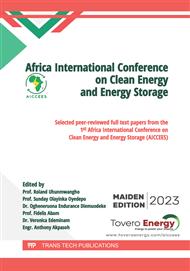p.27
p.43
p.57
p.67
p.81
p.91
p.115
p.129
p.149
“Energy Poverty” as a Nigerian Problem, “Energy Mix” as a Solution
Abstract:
This paper is aimed at minimizing the energy gaps concerning “energy poverty” and “energy mix”, with a specific focus on the Nigerian-centric context. Most existing research entailing “energy poverty” are localized according to regions. Nigeria lacks its own definition of energy poverty. The paper’s novelty is thus the attempt to define energy poverty from a Nigerian perspective, following a review of existing definitions. Such a paper would enable more effective energy policies, as a problem definition would be clearer and more streamlined. Beyond the definition is an obvious fact that “energy poverty” is a problem, and the paper therefore proposes the “energy mix” as a solution. The proposed energy is to contain different kinds of energy resources, with the advantages of each maximized and their disadvantages minimized. This articulate paper discusses such technologies (fossil fuels, nuclear and renewables) highlighting the benefits and disadvantages; herein lies the opportunity for Nigeria and alike. A Nigeria where more people are enlightened about “energy poverty” would invariably translate into a better fight against energy poverty.
Info:
Periodical:
Pages:
81-90
DOI:
Citation:
Online since:
March 2024
Authors:
Keywords:
Price:
Сopyright:
© 2024 Trans Tech Publications Ltd. All Rights Reserved
Share:
Citation:


